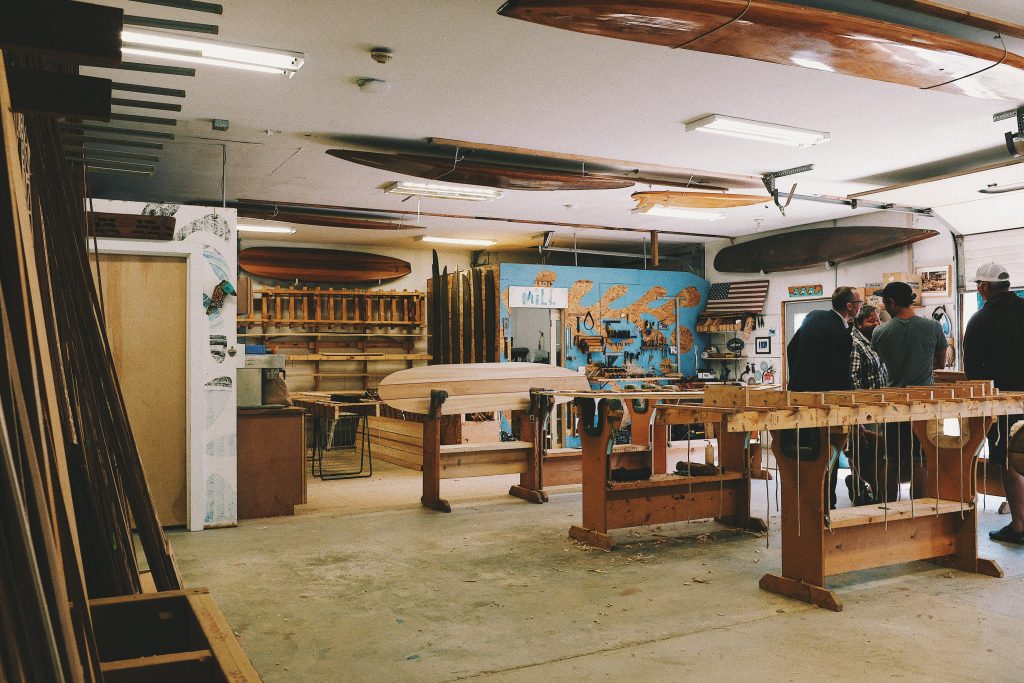Studio Tour: Grain Surfboards Partners With Glenmorangie Single Malt Scotch Whisky
In Maine, two brands unite for an exclusive collaborative product

While it might seem insane, the best surf for Northeasterners occurs in the colder months—thanks to the Atlantic’s hurricane season. From October through December, the East Coast is battered incredible glass-smooth waves and it’s not uncommon to see a slew of wet-suited bodies bobbing up and down in the water in York, Maine—like we did when we visited recently.
And some of those surfers might be floating on a Grain surfboard, whose shop is located just blocks from the beach. We were given the opportunity to visit York recently, meet the brains behind Grain Surfboards (founder Mike Lavecchia, shop manager and lead board-builder John Hamblett, workshop manager and social media manager Nolan Collins, and their shop dogs Chester and Charlie) and take a tour of their studio to learn a little more about their process and about their recent collaboration with the team Glenmorangie Single Malt Scotch Whisky.

Every year, the team at Glenmorangie partners with a brand to create a new, collaborative project. The goal is to find new and interesting ways to convey the uniqueness of their product—and they call the series, Beyond The Cask.
In 2016, the first year of collaborations, they partnered with renowned sunglasses brand Finlay & Co to develop shades carved from deconstructed and re-shaped whisky barrel staves. The second year was a partnership with Portland, Oregon-based Renovo Bicycles—a company that crafted made-to-order wooden bicycles.

For 2018, Glenmorangie formed their most ambitious (and, in our eyes, successful) Beyond The Cask partnership yet, with Grain: limited edition, custom-built surfboards crafted from re-purposed whisky casks.

Even though their studio sits just a couple blocks from the beach, it feels both detached and out of the way—in the best of ways. The crew lives in a world they’ve created for themselves, here—and everyone comes to work excited and happy. With them, it’s evident that making the best surfboards isn’t just a business strategy.

The reason people love Grain Surfboards the way they do—and the reason Glenmorangie decided to partner with them—is because they do everything with authenticity. Each and every board is assembled and shaped by hand, all inside a little building on a little chunk of farmland littered with other cars and various projects, and even a couple of old trucks.

“We noticed their hard work and the attention to detail that goes into every one of these boards,” says Brendan McCarron, head of maturing whisky stocks at Glenmorangie, who joined us on our visit. “For us, it was important to find a brand who put just as much work and dedication into their products as we do into our whisky. It seems like a strange collaboration until you look at the two brands and realize the only real difference between us is they make surfboards and we make whisky.”

The Glenmorangie boards are the product of months of research and development. Each is made using Glenmorangie barrel staves (roughly 12-14 per board, according to Lavecchia). The leftover scotch is baked out of the staves, which are then carefully bent and re-shaped, then cut, and clamped and glued into the two panels that eventually get clamped and glued to the precision CNC machined innards that help make the board so light. They’re durable, but each board only weighs between 13 and 14 pounds.

From there, Hamblett, Grain’s master board-shaper, slowly shaves away every board’s edges to give it the precise shape and lines that eventually make the staves—which still smell of single malt, by the way—look less like staves and more like a surfboard. Once Hamblett’s satisfied, the boards are taken next door to the glass room where they receive a treatment of fiberglass cloth and epoxy, as well as all the necessary hardware and vents to make them as functional as they are beautiful.
After all the proper holes are drilled, vents are placed, and hardware is installed, the boards receive a final coat or two of epoxy, and are then baked to glassy perfection. For regular boards, the process is nearly identical, only the wood is sourced locally and is stored in an on-site lumber shed. (And they don’t have to bake the whisky out of it.) After the boards are complete, they’re packaged up and sent to their new homes.

Hamblett, Collins, and Lavecchia all explain that they only make about 50 boards a year, but also sell DIY board kits, host classes, and more. “Nobody here is getting rich,” Hamblett adds, “But that was never really the idea to begin with. We’re all more concerned about being happy.”

The Glenmorangie boards hold a special significance with the Grain team, because it was apparent from the very beginning that they would be a natural fit. “These boards are really special,” Lavecchia says, after a couple whiskies. “That’s what we loved so much about this project. There’s a lot of history behind every single one of these barrels—the aging, where they’re from, where they’ve been. There’s a lot of meaning behind this wood, and now we get to take it a step further and shape it into these boards that are going to last a real long time for whoever buys one.”
The Glenmorangie + Grain Surfboards Beyond The Cask boards (called The Glenmorangie Special on the Grain website) are available for purchase online, on a very limited run. One of these boards will cost $5500, while regular Grain boards start at $2000.
Images by Maxwell Barna












